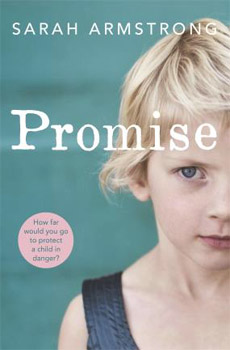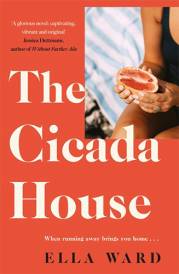Promise

Promise
How far would you go to protect a child in danger?
When a new family moves in next door, it takes Anna just two days to realise something is very wrong. She can hear their five-year-old daughter Charlie crying, then sees suspicious-looking injuries on the little girl that can't be ignored.
Anna reports the family to the police and social services but when no one comes to Charlie's aid, Anna understands that she is alone with her fears for Charlie's life. So when Charlie comes to her door asking for help, the only thing Anna can think to do is take the girl and run.
Raising delicate but deeply felt questions about our individual responsibility for the children around us, Promise is a novel that obliges us to ask: if something dangerous is happening next door, what would I do?
Sarah Armstrong's first novel, Salt Rain, was shortlisted for the 2005 Miles Franklin Award, the Queensland Premier's Literary Prize and the Dobbie Literary Award. Her second novel, His Other House was published in 2015 to wide critical acclaim. Sarah grew up in a family with no television, which meant she was a voracious (if fairly indiscriminate) reader. She went on to study journalism, and joined ABC Radio Current Affairs where, in 1993, she won a Walkley Award. Later she became a researcher and field producer on ABC TV's 'Foreign Correspondent' program. She is married to the writer Alan Close and lives in northern NSW.
Promise
Macmillan
Author: Sarah Armstrong
RRP: $32.99
Interview with Sarah Armstrong
Question: What inspired the story of Promise?
Sarah Armstrong: I saw media reports about a two-year old boy who died, his mother charged with his murder. In a television story, neighbours told how they'd been concerned about him and had reported him to community services several times. I put myself in the shoes of those neighbours; they'd done their best to get him to the attention of authorities, they'd called several times, and yet, the boy died. I imagined that if I were them, I'd feel frustrated and helpless and might have wished that I'd just picked him up one day and put him in my car and driven away. That idea was what sparked the novel. I think the reason the story captured my attention was because since my daughter was born in 2010, I developed a heightened awareness of the vulnerability of children. Sometimes I'd lie awake and think about the fact that - inevitably, certainly – there were small children in my town being abused. And I felt a terrible helplessness to think that. So creating a character who takes decisive action was perhaps a way for me to have a conversation with myself (and then, once published, with others) about how far our responsibility for other children extends.
Question: How much of your inspiration comes from real life and real people?
Sarah Armstrong: The spark for a story often comes from real life, as in PROMISE. My last novel, HIS OTHER HOUSE, was also prompted by a newspaper article (about a man with two families). But I don't draw from my own life, except that I write about questions and themes that interest and preoccupy me. No one would recognise themselves in my novels and if they do, they are mistaken! My characters come entirely from my imagination, although occasionally I might lend them a small quirk or physical characteristic from someone I know. For instance, I might decide that the character walks like my friend from high school. But other than small characteristics, the character is like a person unto themselves. They seem to arrive on the page fully formed, which is a really rather miraculous process.
Question: There are several issues raised in this book. Was this deliberate or did the story evolve this way?
Sarah Armstrong: I don't ever sit down and come up with themes and issues I'd like to explore in a book. I think if I did that, the story would flop because it wouldn't arise from me organically. I guess because I am a woman in her late 40's, I tend to explore issues that might be of concern to many woman of my age. Promise not only asks how far we might go to protect a child in danger, but explores many aspects of mothering, including mothering a child not your own, what makes a good mother, what it is to be motherless and being childless. I faced the possibility of childlessness (Al and I had our daughter via IVF when I was nearly 42 and I had plenty of time to contemplate the prospect of not becoming a mother) and now, most happily, contemplate many other aspects of mothering, including the power parents have over their children. While I was writing PROMISE I really considered how pervasive that notion is that parents -own' their children.
If I hadn't had a child I suspect I'd not have written this novel.
Question: What do you recommend we should we do if we believe a child is being abused?
Sarah Armstrong: First I should say that I am no expert on child protection. But I do know that community services in each state have helplines you can call (anonymously if you wish) to report a child at risk. And I think it's really important to call if you know a child is being abused; the child may have no other advocate. You might be it. Community services are so understaffed that just one report of a child being at risk is unlikely to prompt a caseworker to visit a family, anyway. It usually takes several, if not many, notifications.
If the situation is immediately dangerous, then call the police. I remember watching a panel discussion of family violence on the ABC and a senior NSW police officer said that if we see or hear any family violence then we should call the police. Just call the police. Violence is violence.
In a less acute scenario involving a teenager, you could make sure they know you are there to listen and offer support.
In an instance like a parent smacking and screaming at a child in a supermarket, I would try to offer the parent support and say something like, -Can I help? You look like you're having a hard time.' Support for that struggling parent is support for the child.
I'm not advocating people abduct an abused child, like my character, Anna, does, although I understand why she did it. Since writing the book I've been writing letters to the state government urging them to increase funding to combat and deal with the aftermath of family violence, including violence against children.
Question: What do you hope readers take from the story of Promise?
Sarah Armstrong: I hope it will prompt some thought on this question of how far our responsibility for other children extends. I also hope the book is entertaining and gives the reader that feeling that the Norwegian writer Karl Ove Knausgaard describes as peace of mind, because -I was no one and no one was me.' I love that feeling I have while reading, of being no one, and outside time.
Interview by Brooke Hunter
MORE



